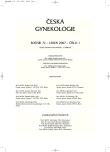Choroid Plexus Cysts and Risk of Trisomy 18. Modifications Regarding Maternal Age and Markers
Cysty choroidálního plexu a riziko trizomie 18. Modifikace ve vztahu k věku a markerům
Cíl studie:
Naším cílem je zhodnocení rizika chromozomálních abnormalit, zvláště trizomie 18, spojené s výskytem izolované cyst(y) choroidálního plexu (CPC) u gravidních žen, které podstoupily ultrazvukové vyšetření v druhém trimestru.
Typ studie:
Přehledný článek.
Název a sídlo pracoviště:
Gynekologicko-porodnická klinika 1. LF UK, Praha, Nemocnice na Bulovce.
Předmět studie:
Cysty choroidálního plexu (CPC) se vyskytují poměrně často u žen s chromozomálními aneuploidiemi, zvláště pak u trizomie 18 (Edwards). Přestože je všeobecně akceptována amniocentéza u žen s rizikem chromozomálních aneuplodií, nepanuje tato shoda stran trizomie 18, pokud je přítomna izolovaná CPC. Zhodnotili jsme další faktory týkající se věku matky a screeningových markerů pro odhad rizika chromozomálních aberací.
Kazuistika:
Prezentujeme kazuistiku trizomie 18 chromozomu, která byla diagnostikována na základě detekce CPC ultrazvukem a jejího dalšího sledování pomocí NMR a následné diagnostiky amniocentézou.
Závěr:
Je všeobecná shoda na tom, že cysty chorioidálního plexu jsou ve spojení s dalšími kongenitálními anomáliemi důvodem k provedení amniocentézy. Přítomnost izolované CPC se pohybuje kolem 1 % v celkové populaci, avšak kolem 30 % u plodů s trizomií 18, jejichž prevalence je 3 z 10 000 gravidit. Metaanalýzy hodnotí výskyt trizomie 18 jako 1 : 374 v případě izolované CPC. Tato hodnota nepřekračuje riziko amniocentézy, kde je riziko abortu 1 : 200, ale také riziko Downova syndromu u 35leté ženy, které je 1 : 270, dosahuje však rizika Downova syndromu u 37leté ženy. Na základě těchto faktů nelze doporučit amniocentézu při přítomnosti izolované CPC, ale absenci dalších abnormalit. Amniocentéza je pak obhajitelná pouze u pacientek vyšších věkových kategorií.
Klíčova slova:
cysta chorioidálního plexu, trizomie 18, věk matky, kombinovaný screening
Authors:
K. Hurt 1; O. Šottner 1; J. Záhumenský 1; M. Halaška 1; M. Krčmář 1; Daniel Driák 1
; B. Zmrhalová 1; I. Rakovičová 2
Authors‘ workplace:
Gynekologicko-porodnická klinika 1. LF UK, Praha, Nemocnice na Bulovce
přednosta prof. MUDr. M. Halaška, DrSc.
1; GPS Radotín, Praha
2
Published in:
Ceska Gynekol 2007; 72(1): 49-52
Category:
Original Article
Overview
Objective:
Our aim was to evaluate the risk of chromosomal abnormalities esp. trisomy 18, associated with isolated choroid plexus cyst(s) in pregnant women undergoing second-trimester ultrasonographic examination.
Design:
A review article.
Setting:
OBGYN clinic of the 1st faculty of medicine, Prague, Teaching hospital Bulovka.
Subject:
Choroid plexus cyst(s) (CPC) are more common in fetuses with chromosomal aneuploidies, particularly trisomy 18. Although it is accepted that the risk of karyotypic abnormality justifies amniocentesis in the case of other associated abnormalities are present, disagreement continues as to the risk of trisomy 18 in a fetus with an isolated choroid plexus cyst. We evaluated additional consideration of maternal age and multiple-marker screening for chromosomal aneuploidy in the assessment of risk.
Case report:
We report a trisomy 18 case that was diagnosed on the basis of CPC detection by ultrasound, NMR, and further amniocentesis.
Conclusion:
It is well accepted that choroid plexus cyst(s) in association with other congenital anomalies warrant amniocentesis to determine fetal karyotype. The presence of isolated CPC varies around 1% in general population, but around 30% in fetuses with trisomy 18 where the prevalence is 3 per 10,000 pregnancies. Metaanalyses reported incidence of trisomy 18 of 1 in 374 in fetuses with isolated CPC. These risks do not exceed the 1 : 200 risk of pregnancy loss after amniocentesis and also the 1 : 270 risk of Down syndrome (DS) in a 35-year-old woman, but exceeds the risk for DS of a 37-year-old woman. Thus these findings suggest that amniocentesis should not be offered to pregnant women in the presence of isolated fetal choroid plexus cyst(s), but in the absence of other pathologies. Amniocentesis is then justified only in the patient with advanced maternal age.
Key words:
choroid plexus cyst, trisomy 18, maternal age, multiple-marker screening
Labels
Paediatric gynaecology Gynaecology and obstetrics Reproduction medicineArticle was published in
Czech Gynaecology

2007 Issue 1
-
All articles in this issue
- International Comparation Level of Perinatal Care in the Czech Republic from the WHO View
- Transvaginal Hydrolaparoscopy and Ultrasonographically Guided Transvaginal Hydrolaparoscopy – Two Outpatient Methods of Pelvis Examination
- EmbryoGlue the Transfer Medium with Hyaluronan in the IVF+ET Program
- Efektivita měření nosní kosti jako UZ markeru pro Downův syndrom v 11.-13+6. týdnu gravidity
- Does the Detection of Disease in Asymptomatic Period Improve the Prognosis of Patients with Endometrial Carcinoma?
- Prospective Study the Prevalence of Different Candida Strains and their Sensitivity to Different Antimycotic Treatment in Women with Vulvovaginal Candidosis
- Vulvovaginitis. Occurrence and Importance of Mixed and Unclassifiable Pictures
- Prophylactic HPV Vaccination
- TVT SECUR System – Tension-free Support of the Urethra in Women Suffering from Stress Urinary Incontinence – Technique and Initial Experience
- Choroid Plexus Cysts and Risk of Trisomy 18. Modifications Regarding Maternal Age and Markers
- Ovarian Hypertimulation Syndrome: a Review
- Remarks on Embolization of Uterine Fibroids
- Laparoscopic Myomectomy: Indications and Limits
- Ovarian Tissue Cryopreservation
- Czech Gynaecology
- Journal archive
- Current issue
- About the journal
Most read in this issue
- Choroid Plexus Cysts and Risk of Trisomy 18. Modifications Regarding Maternal Age and Markers
- Efektivita měření nosní kosti jako UZ markeru pro Downův syndrom v 11.-13+6. týdnu gravidity
- Ovarian Hypertimulation Syndrome: a Review
- Laparoscopic Myomectomy: Indications and Limits
